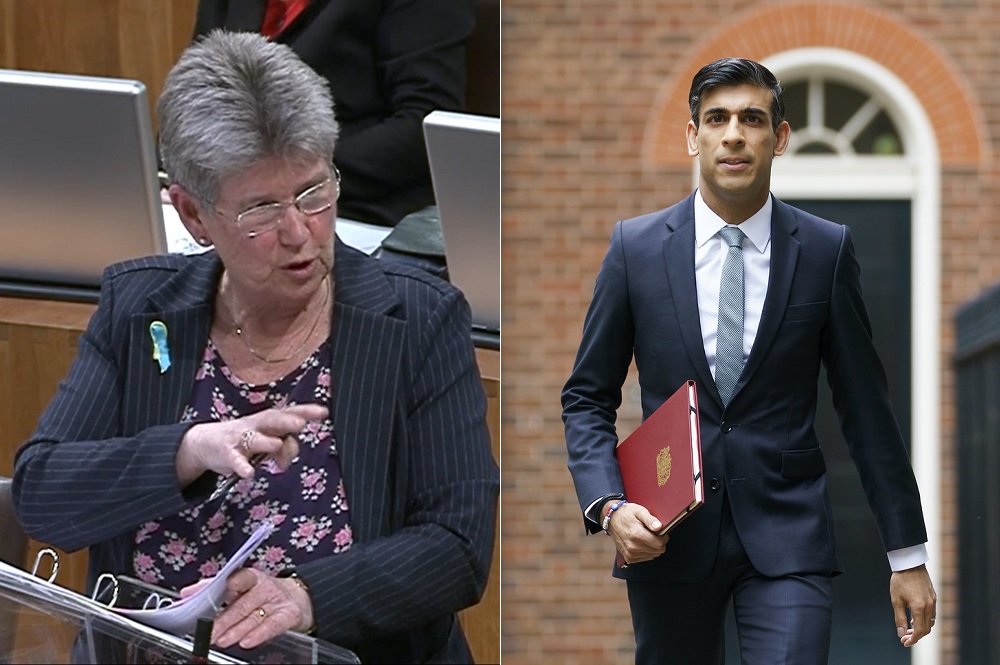Minister calls for urgent action to alleviate the energy crisis in Wales

A Welsh Government minister has called on the UK Government to take urgent action to alleviate the financial pain and worry being experienced by families and households all over Wales.
Official figures published today show that almost 200,000 households in Wales – 14% – were living in fuel poverty in October 2021 and a further 153,000 households were at risk of fuel poverty since OFGEM raised the domestic energy cap by 54% in April.
In a written statement today, Wales’ Minister for Social Justice, Jane Hutt said that the figures were ‘stark and worrying’ and showed the depth of the energy crisis with tens of thousands more people living in energy insecurity and fuel poverty and throwing ‘inequalities starkly into focus.’
She hit out at the Chancellor Rishi Sunak’s Spring Statement last week as an ‘ideological, regressive statement’ which failed to protect the most vulnerable in society, saying it lacked practical measures to help those who need help the most, with nothing for those who cannot work and those on lower incomes.
Ms Hutt claimed that the action offered to date – the £200 rebate on electricity bills, which must be repaid by every bill payer over five years – is too little and called for the UK Government to take concerted and targeted action to ease the cost-of-living crisis by:
- Paying the £200 electricity bill rebate as a non-repayable grant to all bill payers.
- Introducing a lower energy price cap for lower income households so they are better able to meet the costs of their energy.
- Increasing the rebate paid through the warm homes discount and winter fuel schemes.
- Removing all the social and environmental policy costs from household energy bills and instead meeting them from general taxation, at least part-funded by a windfall tax on the excess profits being made by gas and oil producers.
- Reinstating the £20-a-week uplift to Universal Credit.
The ‘soaring’ increases in energy prices at the beginning of April have coincided with increased standing charges on domestic energy bills, and figures show that people in Wales are among the hardest hit in the UK.
The highest increases are being seen in North Wales where the standing charge is going up by up to 102%, with the additional costs disproportionately hitting those on a lower income and those with pre-payment meters.
Stark and worrying
By revising the 2021 estimates of fuel poverty, to take account of electricity, mains gas and heating oil prices from 1 April 2022, and assuming all households are on the new price cap the Welsh Government estimates:
- Up to 45% (614,000) of all households could be in fuel poverty following the price cap increase in April 2022
- Up to 8% (115,000) of all households could be in severe fuel poverty
- Up to 15% (201,000) of all households could be at risk of falling into fuel poverty.
In her statement Ms Hutt said: “These figures are stark and worrying; they show the depth of the energy crisis before the winter started and before OFGEM raised the domestic energy cap by 54% in April.
“Sadly, we know the worst is yet to come. We are in the midst of an unprecedented cost-of-living crisis, which is being driven by runaway energy prices. The war in Ukraine has deepened this crisis.
“We hear terrible accounts daily about people and families who are afraid to turn their heating on and from families who face the awful choice between heating and eating.
“We will continue to do all we can to help people through this unprecedented cost-of-living crisis. Since November, we have invested more than £380m in a package of targeted support for people.
“This includes the first round of the Winter Fuel Support Scheme – a £200 payment for eligible low-income households. This will be extended in winter 2022-23 to reach more households.
“People are also starting to receive their £150 cost-of-living payment – this is available to everyone paying council tax in bands A to D and all those receiving support from the Council Tax Reduction Scheme in all council tax bands. A further £25m will be available to local authorities in the form of a discretionary fund.”
Support our Nation today
For the price of a cup of coffee a month you can help us create an independent, not-for-profit, national news service for the people of Wales, by the people of Wales.





